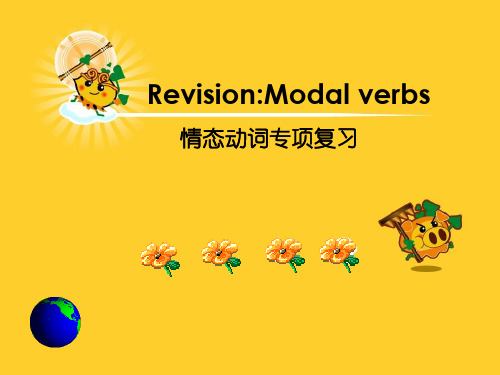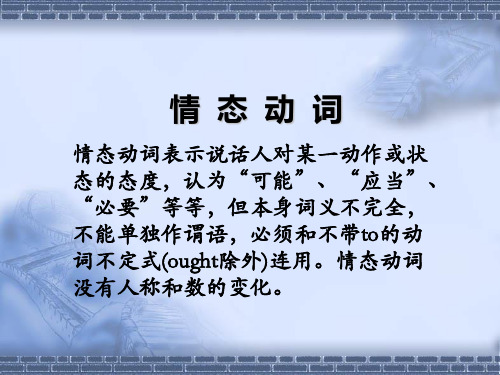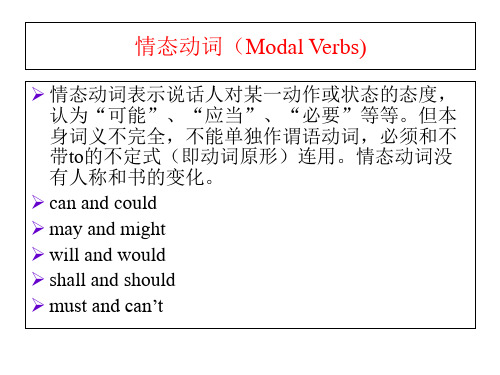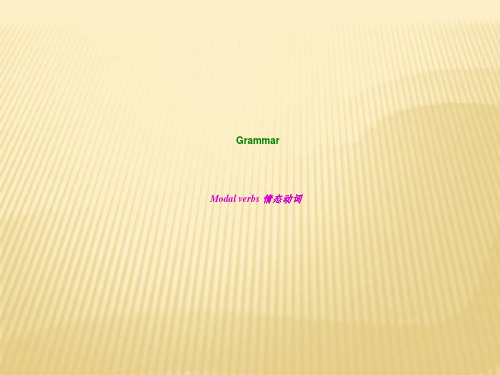高考情态动词考点ppt课件
合集下载
《情态动词》PPT课件

work our this problem. 如果你睡个好觉,那么你就能做出这个题目。 3、表示过去的能力: could表示过去一般的能力, 但不表示做或未做某事;
was/ were able to表示过去有能力并且成功地做了某事, 相当于managed to do something/ succeeded in doing something;
• Mr. Bush is on time for everything. How can it be that he was late for the opening ceremony? (表疑惑、惊讶)
表示请求、允许、允诺
1. 当对方是决策者时,你代表你(们)自己(I, We),或代表第三者(he,she,they)向对方 (you)请示或提出建议时用:
Revision:Modal verbs
情态动词专项复习
How many modal verbs
do you remember?
(情态动词)
一,常见的情态动词有:can, could, may, might ,must, shall, should, will, would, need, have to等
4、具有情态动词的某些特征的有:have(had) to, used to.
情态动词的特征
1、有一定的词义,但不能单独作谓语,它们要和行 为动词或连系动词连用,构成谓语。
2、适用于主语的各种人称和数 have to例外,主语 是第三人称单数时,要用has to)。如:
We/ He must work hard. 我们/他一定要努力工作。 I have to walk home. 我得步行回家。 He has to walk home. 他得步行回家。
was/ were able to表示过去有能力并且成功地做了某事, 相当于managed to do something/ succeeded in doing something;
• Mr. Bush is on time for everything. How can it be that he was late for the opening ceremony? (表疑惑、惊讶)
表示请求、允许、允诺
1. 当对方是决策者时,你代表你(们)自己(I, We),或代表第三者(he,she,they)向对方 (you)请示或提出建议时用:
Revision:Modal verbs
情态动词专项复习
How many modal verbs
do you remember?
(情态动词)
一,常见的情态动词有:can, could, may, might ,must, shall, should, will, would, need, have to等
4、具有情态动词的某些特征的有:have(had) to, used to.
情态动词的特征
1、有一定的词义,但不能单独作谓语,它们要和行 为动词或连系动词连用,构成谓语。
2、适用于主语的各种人称和数 have to例外,主语 是第三人称单数时,要用has to)。如:
We/ He must work hard. 我们/他一定要努力工作。 I have to walk home. 我得步行回家。 He has to walk home. 他得步行回家。
高考英语语法——情态动词(共29张PPT)

I would rather have told it to her.
17
ought to
表示理应做的事,应该做的事,意为“应该、应当”。 She ought to put more energy into her study. He oughtn't to look down upon the poor. 表示推测,意为“应是,应该,会是”。 What she said ought to be true.
Can the answer be right?
He can't/couldn't have turned off the light.
There can't be any person beyond law in China.
He could have passed the driving test.
He used to live there, usedn't/didn't he?
used to说明过去存在而现在已经不在了;而would则与现在没有 联系,过去发生的动作有可能仍然存在,也有可能已不存在。
He used to be a heavy-smoker but he has got rid of the bad
2
表示“许可”,这种用法相当于may,could语气比can更加委婉。
You can help yourself at my home.
You could contact us in order to book a room.
表示可能性,常用于疑问句和否定句中,表示“有可能或绝对不可能”; 在肯定句中要用may或must。
高考英语语法 情态动词
1
17
ought to
表示理应做的事,应该做的事,意为“应该、应当”。 She ought to put more energy into her study. He oughtn't to look down upon the poor. 表示推测,意为“应是,应该,会是”。 What she said ought to be true.
Can the answer be right?
He can't/couldn't have turned off the light.
There can't be any person beyond law in China.
He could have passed the driving test.
He used to live there, usedn't/didn't he?
used to说明过去存在而现在已经不在了;而would则与现在没有 联系,过去发生的动作有可能仍然存在,也有可能已不存在。
He used to be a heavy-smoker but he has got rid of the bad
2
表示“许可”,这种用法相当于may,could语气比can更加委婉。
You can help yourself at my home.
You could contact us in order to book a room.
表示可能性,常用于疑问句和否定句中,表示“有可能或绝对不可能”; 在肯定句中要用may或must。
高考英语语法 情态动词
1
《高考英语情态动词》课件

or uncertain tone It is the past tense of "can"
The Basic Usage of Obligatory Modal Verbs
Must
Expressions opposition or necessity It is used to express a strong recommendation or requirement
Could
Expressions ability or permission in the past or condition
Special Usage of Obligatory Modal Verbs
01
02
03
Must
Expressions opposition or necessity
Should
The basic usage of capability modal verbs
Can
Expressions ability, likelihood, or permission It is used to express capability in the present or future
Could
Can
Expressions ability or possibility
Could
Expressions ability in the past or conditional
Be able to
Expressions ability in the past or conditional
04
Analysis of the examination points of
The Basic Usage of Obligatory Modal Verbs
Must
Expressions opposition or necessity It is used to express a strong recommendation or requirement
Could
Expressions ability or permission in the past or condition
Special Usage of Obligatory Modal Verbs
01
02
03
Must
Expressions opposition or necessity
Should
The basic usage of capability modal verbs
Can
Expressions ability, likelihood, or permission It is used to express capability in the present or future
Could
Can
Expressions ability or possibility
Could
Expressions ability in the past or conditional
Be able to
Expressions ability in the past or conditional
04
Analysis of the examination points of
高考英语情态动词PPT课件

No one answered the phone. They must have already gone out.
His watch must have stopped. I will go and call him.
We must have been playing tennis in the park when you called.
We must stay home, mustn’t we?
He had to stop smoking because his girl friend didn’t like it.
等。在口语中,can可以代替may表示许可,而may比
较正式。
(能力)
The theatre can seat(2许50可0 )people.
You can go now.
(许可)
He said I could borrow his bike.
She asked wheth(er可s能he性c)ould take the books out
You may go now.
May I watch TV after supper?
Yes, you may. / No, you mustn’t.
★有时为使语气婉转一些,可以用下面的方式回答这种 问题:
Yes, please. Certainly. Please don’t. No, you’d better not. 2) 表示可能性,有“或许”、“可能”之意,用might 语气更加不肯定。后跟一般式、进行式,指现在;后跟 完成式,指过去。
If I am busy, I may / might not go.
He may / might not have known it.
高中英语语法专题复习课件--情态动词(共22张PPT)

but one of them 8. __c_o_u_ld___ (must, could) be your last. Decisions! Decisions! You may ask: 9. __m__u_st___ (can, must) I make decisions? The answer is yes. In most cases, you 10. __c_a_n_'_t__ (can't, needn't) skip this process.
_m__ig_h_t___ (shall, might) become the
richest.
(江西2014)
5. George __c_a_n_'t___ (mustn't, can't) have
gone too far. His coffee is still warm.
(浙江2016)
6. I _n_e_e_d_n_'_t_ (needn't, couldn't) have
2. No reader __s_h_a_ll___ remove a book from the library without the permission of the librarian.
can shall may should need
3. The girl ___ca_n____ not be Mary — she's in New York.
3. “情态动词+ have done”结构 1) could / might / should / ought to / need
have done意为“本来能/可能/应该/需 要做……,但实际上未做……”。如: He could have escaped, but he chose to stand and fight. It was an easy test and he should have passed, but he didn't.
高考英语一轮复习——情态动词七大考点课件(共37张PPT)

1.作为情态动词用,常用在否定句和疑问句中。 疑问句:Dare (need) +主语 +动词原形 否定句:主语 + daren’t (needn’t) +动词原形
I daren’t walk through the forest at night. Dare you walk through the forest at night? You needn’t return the book now. Need he go yesterday?
4. 情态动词短语的使用:
Can’t /couldn’t …… too …… Can’t /couldn’t ……enough Can’t help doing Can’t help do May/might as well do
would like/love to do… would rather do…
4. He would rather to die than to give in. He would rather die than give in.
5. You’d better to have your hair cut today. You’d better have ...
5 可兼做行为动词的情态动词:need 、 dare
2.dare,need作实义动词用,用于肯定,否定, 疑问句,有人称、时态、和数的变化,后+ to do。 He dares to go there by himself. He has grown up,we don’t need (to )worry about him.
3.Sth need( want, require)+ doing/ to be done The house needs cleaning/ to be cleaned The boy needs sending to the hospital at once.
I daren’t walk through the forest at night. Dare you walk through the forest at night? You needn’t return the book now. Need he go yesterday?
4. 情态动词短语的使用:
Can’t /couldn’t …… too …… Can’t /couldn’t ……enough Can’t help doing Can’t help do May/might as well do
would like/love to do… would rather do…
4. He would rather to die than to give in. He would rather die than give in.
5. You’d better to have your hair cut today. You’d better have ...
5 可兼做行为动词的情态动词:need 、 dare
2.dare,need作实义动词用,用于肯定,否定, 疑问句,有人称、时态、和数的变化,后+ to do。 He dares to go there by himself. He has grown up,we don’t need (to )worry about him.
3.Sth need( want, require)+ doing/ to be done The house needs cleaning/ to be cleaned The boy needs sending to the hospital at once.
高中英语情态动词各种用法课件(共47张PPT)

一 、表能力 :表现在的或一般的能力:表示 现在的或一般的能力用can 或 be able to. 一 般的能力是指你无论什么时候做什么事情就 能做到的能力。表示现在的能力或一般的能 力时,can比be able to 更普遍。
A computer can’t think for itself; it must be told what to do. (表示一般的能力)
This can’t / couldn’t be done by him. (表示不 相信)
He could be on his way home now. (could 不 如 may / might常用)
Can this be done by him? (表示一种疑惑、 惊讶)
(3)would, could, should, might 并不一定 与过去的时间有关,而是表示可能性弱于他 们相应的现在形式。如:
do something / succeeded in doing sth.
The fire spread through the hotel very
quickly but everyone was able to get out. (过去有能力并成功地做了某事)
(3) could have + 过去分词,表示过去有 能力做但未做。
表示对过去已经发生的行为进行推测,意为 “想必 / 准是/ 一定做了某事
It must have rained last night, for the road was quite muddy.
The lights were out. They must have been asleep.
2. can have done
情态动词 专题课件(共28张PPT)

➢ 5. (may/can) ____c_a_n_____you swim? 表示能力
➢ 6. Listen, please. You (may not/might not)
____m__a_y__n_o_t______ speak during this exam.
表示不允许
may, might, can, could
may, might, can, could
表示猜测
➢ 1. They (can/might) ____m_i_g_h_t___be away for the
weekend but I’m not sure.
表示许可
➢ 2. You (may/might) ___m__a_y____leave now if you
can and could
➢So he can carry heavy books. ➢ability ➢He couldn't open the door by himself. ➢ability ➢Could you open the door, please? ➢request
can and could
表示猜测(不可能)
➢7. They (can not/may not) ___c_a_n_n_o_t_______ still be out, the light is on in the house.
➢8. You (couldn’t/might not) 表示许可
____c_o_u_ld_n_’_t_______ smoke on the bus.
➢9. With luck, tomorrow (can/could) ___c_o_u_ld____be a cooler day. 表示猜测
高考语法专题复习 情态动词(共16张PPT)

= He managed to flee ( succeeded in fleeing ) Europe before the war broke out.
常见辨析2: must与have to
熟 读 深
years old. Lucy also keeps taking exercise every day. She says that she has表to不[得3]不do some sports because she mu表st必[4须] keep slim. “You sha表ll[告5诫] get fat soon if you don’t take exercise every day.”
in bold to the usages on learning material Lucy is an outgoing lady. She can表[1能]力play
many kinds of musical instruments. Actually,
she cou表ld能[2力]play the piano when she was 8
思 she usually says to her friends.
As for her, an elegant lady shoul表d[应6]该try to keep fit. However, last week, she found that she
migh表t[可7能] put on weight and she was worried
Q2: What can we do to show our true love to our beloved parents and respectable teachers?
常见辨析2: must与have to
熟 读 深
years old. Lucy also keeps taking exercise every day. She says that she has表to不[得3]不do some sports because she mu表st必[4须] keep slim. “You sha表ll[告5诫] get fat soon if you don’t take exercise every day.”
in bold to the usages on learning material Lucy is an outgoing lady. She can表[1能]力play
many kinds of musical instruments. Actually,
she cou表ld能[2力]play the piano when she was 8
思 she usually says to her friends.
As for her, an elegant lady shoul表d[应6]该try to keep fit. However, last week, she found that she
migh表t[可7能] put on weight and she was worried
Q2: What can we do to show our true love to our beloved parents and respectable teachers?
高考情态动词考点ppt课件

I must go to the bank and get some money. Cars mustn’t park in front of the entrance.
2. 在以must 开头的疑问句中,肯定回答用must; 否 定回答用needn’t 或don’t have
—Must we hand in our exercise books now?
1. used to表示过去的习惯动作或状态(现已不复存在) He told us he used to play football when he was young.
疑问句: Did you use to go there? / Used you to go there? 否定句: I didn’t use to go there. / I usedn’t to go there. 反意疑问句或简略回答: She used to be very fat, didn’t she?
What shall we do this weekend?
3. shall 常用于主语是第三人称的条约、法律法规、规 章制度等文件中表“义务”或“规定”
One of our rules is that every student shall wear school uniform while at school.
.
10
(六)should
1. 表义务, 意为“应该”(某件事宜做),用于各种人称。 You should be polite to your teachers. You shouldn’t waste any time.
2. 表推测,意为“想必一定、照说应该、估计”等。 The film should be very good as it is starring first-class actors. They should be home by now.
2. 在以must 开头的疑问句中,肯定回答用must; 否 定回答用needn’t 或don’t have
—Must we hand in our exercise books now?
1. used to表示过去的习惯动作或状态(现已不复存在) He told us he used to play football when he was young.
疑问句: Did you use to go there? / Used you to go there? 否定句: I didn’t use to go there. / I usedn’t to go there. 反意疑问句或简略回答: She used to be very fat, didn’t she?
What shall we do this weekend?
3. shall 常用于主语是第三人称的条约、法律法规、规 章制度等文件中表“义务”或“规定”
One of our rules is that every student shall wear school uniform while at school.
.
10
(六)should
1. 表义务, 意为“应该”(某件事宜做),用于各种人称。 You should be polite to your teachers. You shouldn’t waste any time.
2. 表推测,意为“想必一定、照说应该、估计”等。 The film should be very good as it is starring first-class actors. They should be home by now.
高中英语语法 情态动词用法总结(20张PPT)-经典通用课件资料

A. could B. would C. should D. might
C
2. What do you mean, there are only ten tickets? There_____
A. should CA. will
B. would D. shall
be twelve.
2021/10/10
13
5. must
1. 表示义务或强烈的劝告,意为“必须”“应该”, 其否定式表示“不应该”“不许可” “不准”“禁止”。
Eg: 1) You must finish your homework first. 2) Children mustn’t speak like that to their parents.
3. 表推测,用于肯定句,意为“一定”“务必”。
Eg: 1) Betty must be in the next room. 2) He must be watering the flowers in his garden.
2021/10/10
14
Complete the following sentences using modal verbs.
5) Can/Could I use your dictionary? 6) Could you lend me a hand?
3. 表示“请求” “允许”(表请求时,口语中常用 could 代替 can 使语气更委婉,回答时用can)
2021/10/10
4
4. 表示“许可”,可与may 换用。 You can go home now.
1. 表“请求、建议”等,用 would 比用will 委婉,客气些 Eg: 1)Will you lend me your book? 2) Would you like a cup of tea?
- 1、下载文档前请自行甄别文档内容的完整性,平台不提供额外的编辑、内容补充、找答案等附加服务。
- 2、"仅部分预览"的文档,不可在线预览部分如存在完整性等问题,可反馈申请退款(可完整预览的文档不适用该条件!)。
- 3、如文档侵犯您的权益,请联系客服反馈,我们会尽快为您处理(人工客服工作时间:9:00-18:30)。
.
7
(三)will/ would
1. 表意愿,用于各种人称的陈述句 I will do anything for you. They won’t lend us any more money.
2. 表请求允许,用于疑问句 Will you send this letter for me, please? Would you mind leaving me alone for a few minutes?
I must go to the bank and get some money. Cars mustn’t park in front of the entrance.
2. 在以must 开头的疑问句中,肯定回答用must; 否 定回答用needn’t 或don’t have to
—Must we hand in our exercise books now?
—Yes, you must. / No, you needn’t. / No, you don’t have to.
.
6
3. 表示可能性或肯定的推断。意为“想必、准是、一定” 等,只用于肯定句。
He must be ill. He looks so pale. She’s wearing a diamond necklace. She must have a lot of money.
He may be at home, but I’m not sure. She may/might not know about it.
3.may还可表祝愿 May you succeed!
.
9
(五)shall
1. shall用于二、三人称的陈述句,表“命令、威胁、警 告、强制、允诺、决心”等
You shall do as I day. (命令) You shall have my answer tomorrow. (允诺) Nothing shall stop us from carrying out the plan. (决心)
2. shall用于一、三人称的疑问句,表征询意见或请求 允许,多与I或we连用
.
4
3. 表可能性或推断,多用于否定或疑问句中; 若用于肯定句中表常有的行为和情形,意为“有
时会;时而可能” That can’t be Mary---she’s in New York. (用于否定句
中表某事肯定不真实。)
He can be stubborn sometimes.
It can be cold here in winter.
What shall we do this weekend?
3. shall 常用于主语是第三人称的条约、法律法规、规 章制度等文件中表“义务”或“规定”
One of our rules is that every student shall wear school uniform while at school.
.
10
(六)should
1. 表义务, 意为“应该”(某件事宜做),用于各种人称。 You should be polite to your teachers. You shouldn’t waste any time.
.
3
考点一:情态动词的基本用法
(一)can/could
1. 表能够做某事(具备某种能力);could主要 指过去能够… Two eyes can see more than one. Could the girl read before she went to school?
2. 表许可;用于疑问句中表请求(could表示的 语气更加委婉);用于否定句中表不允许。 Can I have a look at your new pen? You can’t wear jeans at work.
4. 表说话人生气或不满的情绪,意为“偏要;非得” ---- Must you interrupt now? Can’t you see I’m on the phone? ---- Sorry, sir, but it’s urgent.
5. 用于短语 if you must (do sth) ,表虽然不赞同但可允 许,意为“如果你一定要的…的话” ---- Can I smoke here? ---- If you must.
Modal Verb
.
1
情态动词的语法特征
1. 情态动词 不能单独做谓语。
2. 情态动词没有人称,时态和数的变化, 但有些情态动词,如can, may, will, dare 也 有一般式和过去式的变化。
.
2
Mv 情态动词的个数(15) 4 4 3 ①(4组) can / could,
may / might, shall / should, will / would ②(4对) have to, had better, ought to, used to ③(3个) must, need, dare
Байду номын сангаас
4. 表疑惑或惊讶等情绪;意为“究竟能;难道会; 到底是”
What can they be doing? 他们究竟在干些什么?
Where can she have put it? 她到底把它放哪了?
.
5
(二)must
1. must 用于肯定句中表说话人的意志或义务;或 坚决要求某人做某事;否定mustn’t 表禁止
8
(四)may/ might
1. 表允许,might可以指过去时间,也可指现在时间, 语气更委婉。
You may take whatever you like. May (Might) I ask for a photo of your baby?
2. 表可能(事实上)。might可以指过去时间,也可以 指现在时间,但语气更加不肯定。
3. 表习惯 She will listen to music, alone in her room, for hours. He would spend hours on the telephone.
4. 主语为物时,多用于否定句中,意为“不起作用” The door won’t open.
.
